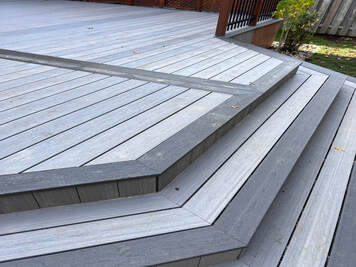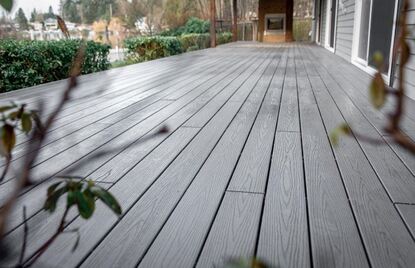1. Durability and Maintenance
Let's start with one of the most important factors to consider: durability and maintenance. You want your deck to be able to withstand the elements and the wear and tear of regular use without requiring constant upkeep. Some materials, like wood, require regular sealing and staining to protect against rot and decay. Others, like composite decking, are virtually maintenance-free and only need occasional cleaning to look their best.
If you're looking for a material that is both durable and low-maintenance, composite decking is a great option. Made from a blend of recycled plastics and wood fibers, composite decking is resistant to mold, mildew, fading, and stains. It doesn't require sanding, staining, or sealing, making it a hassle-free choice for busy homeowners.
2. Aesthetics and Design
Your deck is an extension of your home, so it's important to choose a material that complements your home's style and your personal taste. Wood decking is known for its natural beauty and warmth, and it comes in a variety of colors and finishes. Composite decking offers a more uniform look and is available in a range of colors, textures, and finishes.
When selecting your deck material, think about the overall design aesthetic you're going for. Do you want a traditional wood deck, or are you looking for something more modern? Consider your home's architectural style and color scheme, as well as your outdoor furniture and décor. 3. Cost
Of course, cost is an important factor to consider when choosing your deck material. Wood decking is generally less expensive upfront than composite decking, but it may require more maintenance over time. Composite decking, on the other hand, can be more expensive upfront but may save you money in the long run due to its low maintenance requirements and long lifespan.
When thinking about cost, don't forget to factor in installation costs, as well as any additional features you may want, such as built-in seating or lighting. You want to make sure you're getting the best value for your investment. 4. Environmental Impact
If you're environmentally conscious, you may be interested in choosing a deck material that is eco-friendly and sustainable. Wood decking can be a sustainable option when sourced from responsibly managed forests, but it may also contribute to deforestation and the carbon footprint associated with transporting and treating the wood.
Composite decking, on the other hand, is often made from recycled materials and can be a more eco-friendly choice. Many composite decking manufacturers are committed to reducing waste and greenhouse gas emissions. Consider the environmental impact of your deck material and choose a product that aligns with your values. 5. Safety and Code Compliance
Finally, it's important to ensure that your deck is safe and up to code. Different materials may have different load-bearing capacities and requirements for railings and other safety features. Make sure you're aware of any local building codes or regulations that may affect your deck design and construction.
When choosing your deck material, keep these five factors in mind: durability and maintenance, aesthetics and design, cost, environmental impact, and safety and code compliance. By considering each of these factors, you can make an informed choice that meets your needs and enhances your outdoor living space. Comments are closed.
|
- HOME
- BUILDING SERVICES
- REFINISHING SERVICES
- ABOUT US
-
CONTACT US
- Contact Us
- AURORA DECK BUILDER
- CALEDON DECK BUILDER
- BOLTON DECKBUILDERS
- MARKHAM DECK BUILDING
- NEWMARKET DECK BUILDER
- NEW TECUMSETH DECKS AND FENCES
- NOBLETON DECK BUILDER
- DECK BUILDER RICHMOND HILL
- DECK BUILDER SCHOMBERG
- STOUFFVILLE DECK BUILDER
- DECK BUILDERS THORNHILL
- DECK BUILDER TORONTO
- DECK BUILDER VAUGHAN
- Blog
|
THE COMPANY
Dedicated Professional Deck Builders who will help you realize your vision for a backyard transformation. We will design with you - and build for you. Our work is guaranteed.
|
STRUCTURES
|
LANDSCAPE AND STONE
|
CONTACT US
|
|
|
|
Places we service:
Vaughan ● Toronto ● Markham ● Nobleton ● Aurora ● King City ● Schomberg ● Richmond Hill ● Newmarket ● Brampton ● Bradford ● Bolton ● Mississauga




 RSS Feed
RSS Feed